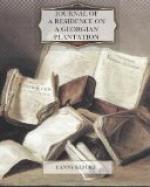The afternoon was rainy, in spite of which I drove to Busson Hill, and had a talk with Bran about the vile caterpillar blights on the wild plum trees, and asked him if it would not be possible to get some sweet grafts from Mr. C—— for some of the wild fruit trees, of which there are such quantities. Perhaps, however, they are not worth grafting. Bran promised me that the people should not be allowed to encumber the paths and the front of their houses with unsightly and untidy heaps of oyster shells. He promised all sorts of things. I wonder how soon after I am gone they will all return into the condition of brutal filth and disorder in which I found them.
The men and women had done their work here by half-past three. The chief labour in the cotton fields, however, is both earlier and later in the season. At present they have little to do but let the crop grow. In the evening I had a visit from the son of a very remarkable man, who had been one of the chief drivers on the estate in Major ——’s time, and his son brought me a silver cup which Major —— had given his father as a testimonial of approbation, with an inscription on it recording his fidelity and trustworthiness at the time of the invasion of the coast of Georgia by the English troops. Was not that a curious reward for a slave who was supposed not to be able to read his own praises? And yet, from the honourable pride with which his son regarded this relic, I am sure the master did well so to reward his servant, though it seemed hard that the son of such a man should be a slave. Maurice himself came with his father’s precious silver cup in his hand, to beg for a small pittance of sugar, and for a prayer-book, and also to know if the privilege of a milch cow for the support of his family, which was among the favours Major —— allowed his father, might not be continued to him. He told me he had ten children ‘working for massa,’ and I promised to mention his petition to Mr. ——.




